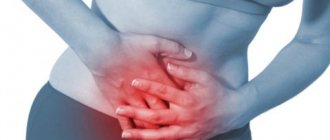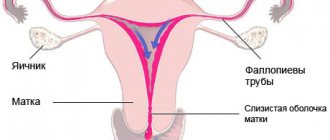Critical days are a difficult period in the life of every woman. It is accompanied by changes in hormonal levels and a number of specific symptoms, from nausea and breast tenderness to pain in the lower abdomen.
Depending on the intensity and frequency, pain during menstruation can be a variation of the norm. However, this is often due to the presence of any violations of the girl’s reproductive system.
It is very difficult to understand on your own why your stomach hurts during menstruation, and the lack of proper treatment can lead to serious problems. Therefore, with this symptom, it is better to immediately contact a gynecologist at the clinic for qualified medical help.
Classification of dysmenorrhea
The answer to the question of why your stomach hurts during menstruation can be answered by a gynecologist. Scientifically, this condition is referred to as dysmenorrhea. Two types of dysmenorrhea can be distinguished depending on the reasons that caused it:
- Primary. This diagnosis is made if the reason why the lower abdomen hurts during menstruation is clearly unknown. In this case, we can often talk about the hereditary nature of the disease. It also affects girls under the age of 25, smokers and those whose first menstruation occurs later than normal. Usually the problem disappears completely with the onset of sexual activity or after the birth of a child.
- Secondary. This type of dysmenorrhea most often occurs in women over 30 years of age and is associated with a gynecological disease and/or previous surgery.
Depending on the severity, three degrees can be distinguished:
- Mild - moderate stomach pain during menstruation, but the woman is able to tolerate these sensations and continues to lead her usual lifestyle;
- Moderate - painful periods, accompanied by weakness, nausea, weakness, and unstable emotional state.
- Severe - unbearably severe pain during menstruation, incapacitating. Accompanied by vomiting, serious malaise, including loss of consciousness.
How does it hurt during menstruation?
Symptoms of menstrual pain and cramps can vary depending on the individual.
Some women experience a dull, throbbing pain, while others experience severe and often debilitating pain in the lower abdomen, ovarian area, radiating to the lower back, thighs, and rectum. Pain usually begins one to three days before menstruation, peaks 24 hours after bleeding begins, and subsides after two to three days. Some girls before menstruation, in addition to pain, also experience nausea, headache, dizziness and loose stools.
Causes of painful periods
Our uterus consists of two main layers. The outer muscle layer, the myometrium, is composed of smooth muscle cells. The inner layer, the endometrium, responds to changes in hormone levels. The endometrium accumulates during the first half of the menstrual cycle in preparation for pregnancy. If conception does not occur, hormonal changes cause the endometrium to release substances known as prostaglandins. They cause the muscles of the uterus, the myometrium, to contract, which causes the endometrial lining to come out through the vagina - this is your monthly menstruation.
A healthy female body naturally produces prostaglandins, which have hormone-like effects. They are involved in various body functions, including contraction of the uterine muscles, which causes pain and causes primary algomenorrhea or menstrual cramps.
At the beginning of your period, the levels of prostaglandins in your body are higher than normal. As a rule, the higher their level, the stronger the pain during menstruation. In contrast, if you are not menstruating due to hormonal contraception, postpartum lactation, or approaching menopause, there is little or no risk of cramping.
The risk of severe menstrual cramps is higher if you smoke, are under 30 years of age, have heavy or irregular bleeding, started puberty before age 12, or have a family history of close female relatives (mother, aunt, grandmother) having very painful periods .
What to do if periods are painful?
If, due to pain before and during menstruation, you miss school, days at work, sports or other activities at least one day a month, contact our gynecology doctor in Moscow. Although menstruation is a normal part of your body's functioning, it is not normal if it is severe enough to disrupt your normal, daily activities.
No matter what, don’t suffer in silence: painful periods are not something you are doomed to live with. The pain can often be successfully treated. Our clinic’s specialists have many safe and effective methods for treating algodismenorrhea, allowing you to effectively and almost 100% get rid of painful periods!
Causes of severe abdominal pain during menstruation
In order to understand how to relieve pain during menstruation, you need to identify the true cause of these sensations.
With primary dysmenorrhea, there are no pathological changes in the genital organs.
The reason is that a woman’s body produces powerful hormone-like substances - prostaglandins.
During menstruation, their content increases sharply, resulting in pronounced spastic contractions of muscles and arteries in the uterus. Because of this, toxic metabolic products accumulate in the uterus, which irritate the nerve endings, causing severe pain.
Since the uterus is located in the pelvis and is close to the ovaries, bladder, and intestines, pain sensations are transmitted along the nerve endings to these organs.
In secondary dysmenorrhea, pain is associated with the presence of gynecological diseases, the most common of which are:
- endometriosis;
- inflammatory diseases of the pelvic organs;
- uterine fibroids;
- adhesive disease of the peritoneum;
- varicose veins of the small pelvis;
- ovarian cysts and tumors;
- inflammation of the urinary system;
- intestinal diseases.
Another number of reasons may not be associated with gynecological disorders at all. After all, in the lower abdomen there are the intestines, ureters, peritoneum and other organs that can also provoke such a symptom.
Therefore, during the gynecological examination, consultation with doctors of related specialties may be necessary. Perhaps, in order to understand how to get rid of pain during menstruation, you will have to undergo a comprehensive examination of the body.
Ketoprofen
An excellent safe NSAID with minimal side effects, just like ibuprofen. The main thing is to observe the correct dosage and adhere to recommendations on contraindications. And although Ketoprofen is usually prescribed for diseases of the musculoskeletal system, it is also perfect for abdominal pain during menstruation.
Ketoprofen MV
Biocom, Russia
Articular syndrome (rheumatoid arthritis, osteoarthritis, ankylosing spondylitis, gout);
symptomatic treatment of inflammatory and degenerative diseases of the musculoskeletal system (periarthritis, arthrosynovitis, tendonitis, tenosynovitis, bursitis, lumbago), pain in the spine, neuralgia, myalgia. Uncomplicated injuries, in particular sports injuries, sprains, sprains or ruptures of ligaments and tendons, bruises, post-traumatic pain. As part of combination therapy for inflammatory diseases of the veins, lymphatic vessels, lymph nodes (phlebitis, periphlebitis, lymphangitis, superficial lymphadenitis). from 169
166
- Like
- Write a review
How to reduce pain
Even in the absence of pathologies, it is useful to know how to reduce pain during menstruation. After all, by following a number of simple recommendations, you can significantly reduce discomfort. If your lower back and stomach hurt before your period, you should:
- reduce the amount of stress;
- exclude heavy foods and foods that cause fermentation in the stomach;
- give up alcohol and smoking;
- maintain a good sleep schedule;
- diversify your diet with foods rich in calcium, magnesium, vitamins B and E;
- add moderate physical activity (yoga, gymnastics, etc.)
Associated symptoms
Painful periods may be accompanied by other symptoms:
- Deterioration of vascular function: manifested by swelling of the face, numbness of the extremities, arrhythmias, headaches and dizziness.
- Emotional and mental disorders: insomnia, drowsiness, irritability, sensitivity to smells, changes in eating habits, depression, bulimia, anxiety.
- Symptoms of a disorder of the autonomic nervous system: digestive problems, bloating, dry mouth, fever, chills, nausea, vomiting, belching, frequent urination, increased sweating, fainting.
- Signs of metabolic disorders: itching, weakness, feeling of wobbly legs, swelling of various localizations.
Treatment of the disease
In order to make a diagnosis, the doctor must exclude diseases of the genital organs.
First of all, it is necessary to collect an anamnesis and examine the patient in a gynecological chair. As additional diagnostic methods, a comprehensive ultrasound examination of the pelvic organs, examination of smears of vaginal discharge, cervical canal and urethra, and PCR diagnosis of sexually transmitted diseases are carried out.
Some patients may need to undergo hysteroscopy - examination of the uterine cavity using a special video camera.
To exclude diseases such as endometriosis, adhesive disease, etc., laparoscopy is sometimes performed - a minimally invasive procedure in which the doctor, using a camera and small punctures, can examine the abdominal cavity and identify the disease.
It is very important not to confuse pain relief with disease treatment. Many women believe that by taking antispasmodics, they will get rid of the problem.
However, the only correct answer to the question of what to do if your stomach hurts during menstruation is to seek medical help from a gynecologist.
The doctor at the private medical clinic “Doctor ANNA” will accurately determine the cause of the discomfort and will make every effort to eliminate it.
Diagnosis of algomenorrhea
Diagnosis of primary algomenorrhea, which means examination by a gynecologist, ultrasound, clinical tests, in most cases does not reveal any abnormalities, except for the fact that a more special laparoscopic examination may reveal signs of early endometriosis. Secondary algodysmenorrhea is diagnosed in parallel with the disease that causes it, and during the diagnosis, the same research methods are used, and sometimes tests for genital tract infections are additionally prescribed.
Menstrual pain - is this normal?
Normally, when the ovary hurts before menstruation, the discomfort cannot be too strong. The presence of mild, nagging pain indicates contractions of the muscles of the uterus, which strives to get rid of the “old” layer of the endometrium.
Over the next month, a “new” endometrium is formed, which is necessary for the embryo to attach to it in the event of fertilization.
In the case when the symptoms of menstruation are too pronounced, the bleeding is excessively profuse, we can talk about the presence of the disease dysmenorrhea.
You should, without wasting time, make an appointment with a doctor and find a disorder in the woman’s body, which is indicated by the pain syndrome.
What are the dangers of painful periods?
It happens that a woman hopes that the symptoms will go away on their own with age, believing them to be a minor deviation from the norm. In this case, the onset of a serious illness may go unnoticed - contacting a doctor will be late, and the risk of complications will increase. In addition, to alleviate the condition of algodismenorrhea, women often use large doses of analgesics. An addiction to these drugs develops, and in the future the dose needs to be increased, and the analgesic effect weakens.
Constant experiences associated with pain and its impact on everyday circumstances can provoke disturbances in the psycho-emotional sphere and create inconvenience in family life.
Treatment of menstrual pain by type of disease
The main goals of treatment are to eliminate pain, normalize the menstrual cycle, normalize the state of the autonomic system and eliminate organic causes of dysmenorrhea. The approach to therapy is developed for each woman individually, based on the primary disease.
- in case of endometriosis, surgical intervention is performed to eliminate foci of endometrial growth;
- in case of hormonal imbalance, it is necessary to take hormonal medications to correct the corresponding disorder;
- infectious and inflammatory processes are usually treated with antibiotics;
- when the pelvic veins are dilated, vasoconstrictor medications are prescribed;
- neoplasms in the pelvis require surgical removal with a biopsy to determine their benignity;
- adhesions in the pelvic organs are also removed through surgery.
Whatever the cause of the disturbing symptom, the doctor will try to solve the problem using conservative methods, and only if absolutely necessary will resort to surgery.
Causes of pain
Pain can be triggered by various factors: heavy loads, exhausting workouts, excessive physical activity, colds, stress. If these phenomena become the causes of menstrual irregularities, then it is not difficult to eliminate the problem, the main thing is to contact a specialist in time.
The moment of pain onset is an important factor in diagnosing cycle disorders. According to the time of appearance, unpleasant painful sensations are divided into primary and secondary.
Primary ones occur immediately after the first menstruation or up to 1.5 years after that. Rarely, the causes of this phenomenon are pathologies or abnormalities in the genital organs; much more often, pain is provoked by disruption of processes in the nervous and endocrine system.
Primary pain can be caused by:
- Hormonal dysfunction.
- Congenital pathologies of the genital organs, abnormal structure or location of the uterus.
- Underdeveloped muscles of the uterine cavity.
- Severe stress, anxiety, depression.
The causes of secondary menstrual pain can be inflammatory, infectious diseases, endometriosis; diseases that are associated with disturbances in the processes in the organs of the pelvic cavity.
Is there a cure for menstrual pain?
Often women do not strive to get rid of pain, they heroically endure it, considering it the norm and getting used to this condition. Some of them take medications uncontrollably, which only aggravates the situation.
As a result, having gotten used to the pain, a woman may not feel how primary dysmenorrhea has turned into secondary, which can hide a number of gynecological diseases. Therefore, it is important to understand that severe discomfort during menstruation is not the norm.
Modern medicine can provide many ways to get rid of unpleasant sensations. However, it is important to identify the true cause and eliminate it, and not the consequence of the problem.
Why is it necessary to treat period pain in the clinic?
- Providing a full range of services. The patient can save money and undergo diagnostics and treatment in one clinic. The doctor writes out directions and conducts a detailed consultation regarding the woman’s actions.
- The clinic is attended by several dozen highly qualified specialists who regularly attend courses and improve their skills. With their help, a woman can get rid of not only the signs of the disease, but also get rid of the root cause.
- If necessary, a woman is provided with a comfortable room and 24-hour medical supervision.
List of sources
- Gynecology. National leadership / ed. IN AND. Kulakova, G.M. Savelyeva, I.B. Manukhina. - M.: GEOTAR-Media, 2009;
- Manusharova, PA Gynecological endocrinology: a guide for doctors / PA Manusharova, E.I. Cherkezova. — M.: Med. information agency, 2008;
- Smetnik V.P., Tumilovich L.G. Non-operative gynecology. - M.: MIA, 2001;
- Clinical recommendations. Obstetrics and gynecology / Ed. G.M.Savelyeva, V.N.Serova, G.T.Sukhikh. 2009;
- Moses V.G., Ozhogina E.V. Primary dysmenorrhea, a manual for doctors, 2012.
Review of painkillers
Of course, painkillers are just a first aid to relieve suffering. They do not solve the problem, but only eliminate its symptoms. First of all, it is necessary to find out the exact cause of menstrual pain by undergoing a thorough examination by specialists. The release form of painkillers includes injections, tablets and suppositories.
Pills. Painkillers are often prescribed to teenage girls when they experience discomfort during their first menstruation, as well as to women with primary dysmenorrhea. The best way to cope with pain is with non-steroidal drugs that fight inflammation and relieve spasms. The advantages of this dosage form also include ease of administration, however, painkillers for menstrual pain should not be used by patients without medical supervision.
Candles. They have a rapid analgesic effect (effective 15-20 minutes after administration). To achieve results, a small dose of the medicine is enough, since its active components are absorbed into the bloodstream, bypassing the liver.
Injections. Indispensable in case of severe pain attack, when immediate action is required. Medicines taken orally are absorbed into the bloodstream over a certain period of time, and severe pain sometimes needs to be relieved as quickly as possible. Injections are also indicated if a woman has diseases of the gastrointestinal tract: they do not irritate the mucous membranes of the esophagus and stomach. Injections can only be given by persons with medical skills (doctor, nurse, paramedic).
Based on the mechanism of action, the following groups of drugs are distinguished:
Antispasmodics. The action of antispasmodic drugs is aimed at relaxing smooth muscle fibers, dilating blood vessels in the pelvic area, thereby reducing the tone of the uterus and relieving spasms.
Analgesics. They inhibit the sensitivity of pain receptors and inhibit the conduction of nerve impulses to the brain. They have both analgesic and antipyretic effects. However, they have a short-term effect, as well as numerous contraindications and side effects1.
Non-steroidal anti-inflammatory drugs. NSAIDs have anti-inflammatory, analgesic and antipyretic effects. The main mechanism of action is inhibition of prostaglandin formation. Prostaglandins are tissue hormones that promote the development of inflammation and accompanying pain.
All of these medications should be used with caution, following your doctor's recommendations regarding dosage and frequency of administration.
Rules for taking painkillers
To avoid possible complications when taking painkillers during menstruation, you must follow several basic rules:
- Before you start taking it, you should consult your doctor and exclude contraindications:
- start taking the medicine with a minimum dose, gradually increasing it;
- do not exceed the recommended dose, no matter how severe the pain;
- do not take painkillers with alcohol, do not drink alcohol during the entire treatment course;
Ways to eliminate pain
There are many methods to reduce pain during menstruation. The most effective methods include:
- Taking painkillers (nurofen, no-spa, dexalgin).
- Frequently drink soothing herbal infusions of mint and St. John's wort.
- Taking iron-containing medications (for heavy bleeding).
- Applying a warm compress to the area of concern (in the absence of infectious diseases).
- Taking a short warm shower.
- Gentle circular massage of the lower abdomen using essential oils of mint, bergamot or saffron.
- Drink as much clean water as possible.
- Physiotherapy (electrophoresis, auto-training).
- Bed rest in the fetal position.
Every woman must know the possible causes of pain in the lower abdomen and methods for eliminating them. This knowledge will help to identify serious disorders of the body at an early stage and begin treatment on time.
Following recommendations for reducing pain during menstrual periods will help you easily survive the first days of menstruation, living a normal, full life.
ONLINE REGISTRATION at the DIANA clinic
You can make an appointment by calling the toll-free phone number 8-800-707-15-60 or filling out the contact form. In this case, we will contact you ourselves.
If you find an error, please select a piece of text and press Ctrl+Enter











